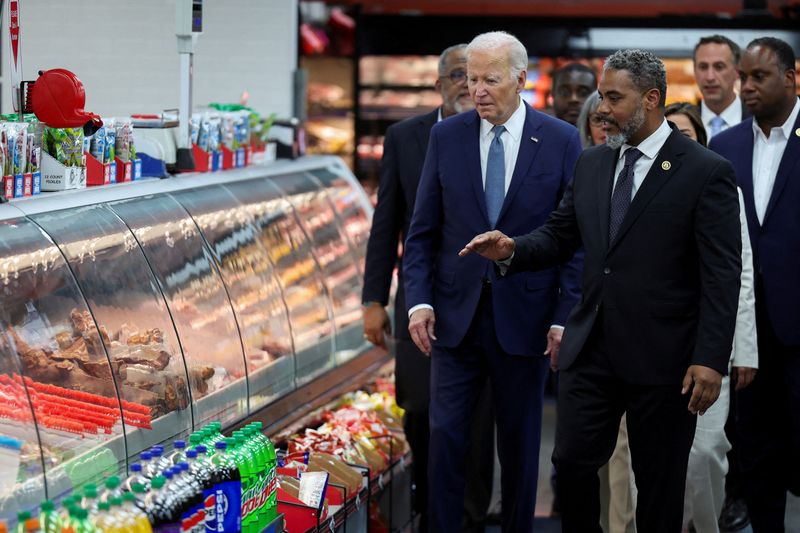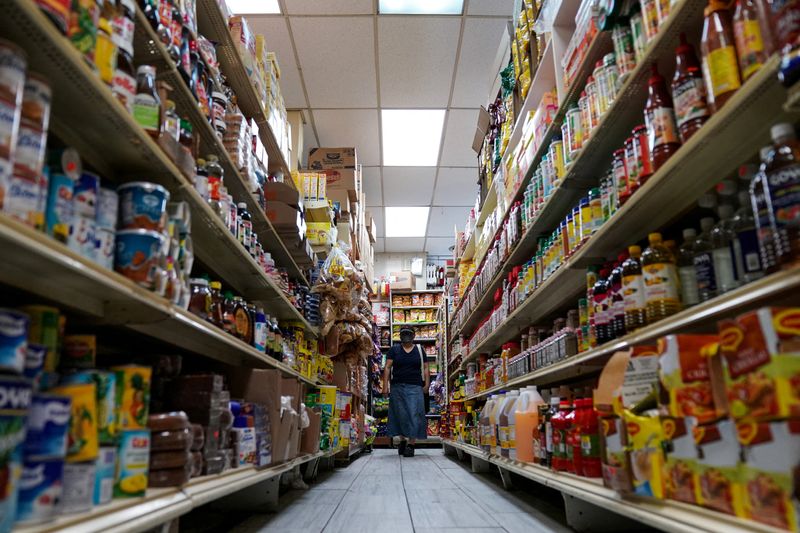By Bo Erickson
WASHINGTON (Reuters) - The level of political donations from major food companies accepted by Democratic lawmakers has ticked higher this congressional election cycle, even as many Democrats have accused the top U.S. grocery chains and their suppliers of pushing prices higher at consumers' expense, a Reuters analysis of Federal Election Commission data shows.
Democrats have reason to focus on food prices, which have risen 25% between 2019 and 2023. Reuters/Ipsos polling shows the economy is voters' top concern and they have higher confidence in Republicans to manage it.
Dozens of Democrats have stepped up their calls since Kroger (NYSE:KR), the nation's biggest grocer by revenue, proposed a $24.6 billion merger with smaller rival Albertsons (NYSE:ACI). The Federal Trade Commission’s challenge to the deal, which it argues is bad for shoppers and workers, goes to trial in an Oregon federal court beginning Monday.
Albertsons' PAC has so far contributed $291,500, more than triple its $90,000 through the full 2021-2022 election cycle. Kroger's PAC is also running ahead of its pace, having donated $141,000 so far, up from $140,500 for the entirety of the 2021-2022 cycle.
At least 154 Democratic lawmakers or their fundraising organizations have accepted contributions from a handful of top food companies during the current campaign cycle. That includes 51 congressional Democrats - one in five - who have done so while publicly blasting corporate greed in the food industry.
Some of the Senate's most vulnerable Democrats - Ohio's Sherrod Brown, Pennsylvania's Bob Casey and Wisconsin's Tammy Baldwin - are among those who both criticized food companies' tactics and taken their donations.
Sixty-five congressional Democrats and their affiliated fundraising committees have received 94 contributions from Kroger’s and Albertsons’ political action committees totaling $185,000, according to the FEC data through June 2024.
The two companies' donations are dwarfed by Walmart (NYSE:WMT), whose PAC has contributed at least $441,500 to Democrats this election.
Corporate PACs are legally allowed to give up to $10,000 to campaigns and typically donate to both parties. Overall, 58% of Kroger's and Albertsons' combined donations went to Republican congressional campaigns this cycle.
Sixty-eight current members of Congress have sworn off accepting corporate PAC money, according to the group End Citizens United, up from 59 two years ago. Activists say lawmakers need to realize it may come with strings attached.
"Large corporations like this don't just give money to elected officials for their health, they do it to expect some type of return," said Morgan Harper, policy director at Fight Corporate Monopolies. "That return can often be in trying to stop the wheels of government from moving to enforce the law against them."
Vice President Kamala Harris also made cracking down on price gouging a focus of the first major economic speech of her presidential campaign.
BLASTING 'GREEDFLATION'
Casey, who faces a stiff reelection fight in Pennsylvania, has said Mondelez (NASDAQ:MDLZ) International stoked "greedflation" by shrinking its Wheat Thins crackers and Double Stuf Oreos, and criticized Procter & Gamble (NYSE:PG) for its prices on toilet paper, dish soap and toothpaste.
His campaign accepted $1,000 donations from PACs for both companies, which supply retailers including Kroger and Albertsons.
Casey's campaign said criticizing donors demonstrated independence.
"Bob Casey is an independent fighter who will always stand up for working people against corporate greed and companies ripping off Pennsylvanians," a campaign spokesperson said.
A Mondelez spokesperson said the company considers "a variety of criteria including positions on public policy issues important to our business, the presence of our employees or facilities in a candidate’s district or state and key committee membership or leadership positions" when making campaign donations.
Brown, whose Ohio reelection bid is rated one of Democrats' most challenging as they seek to defend their 51-49 Senate majority, last year received $2,500 from Cincinnati-based Kroger's PAC and $5,000 from Albertsons' PAC. Brown was also the only lawmaker to receive contributions from the CEOs of both grocery chains, both of whom contributed the maximum $6,600.
He has broadly blamed corporate spending on stock buybacks and executive bonuses for pushing grocery prices higher. He supports the Kroger-Albertsons' deal because the companies are unionized.
"If this merger is done correctly, and Kroger ensures that workers have a seat at the table, the company has the potential to become one of the largest union companies in an industry that is increasingly dominated by nonunion corporate giants," said Brown spokesperson Kevin Donohoe.
The United Food and Commercial Workers International Union, which represents workers at both chains, opposes the merger.
Wisconsin's Baldwin accused General Mills (NYSE:GIS) of "deceptive" pricing for shrinking Cocoa Puffs cereal boxes by 1.2 ounces but charging the same price. Since then, Baldwin’s campaign received a total of $7,500 from General Mills’ PAC.
Baldwin's campaign did not respond to requests for comment.

Congressional Democrats have also blasted rising prices in the meatpacking industry but have still accepted at least $286,000 in campaign donations this cycle from JBS USA, Tyson Foods (NYSE:TSN) and Cargill.
Albertsons declined to comment. The other companies mentioned did not respond to requests for comment.
